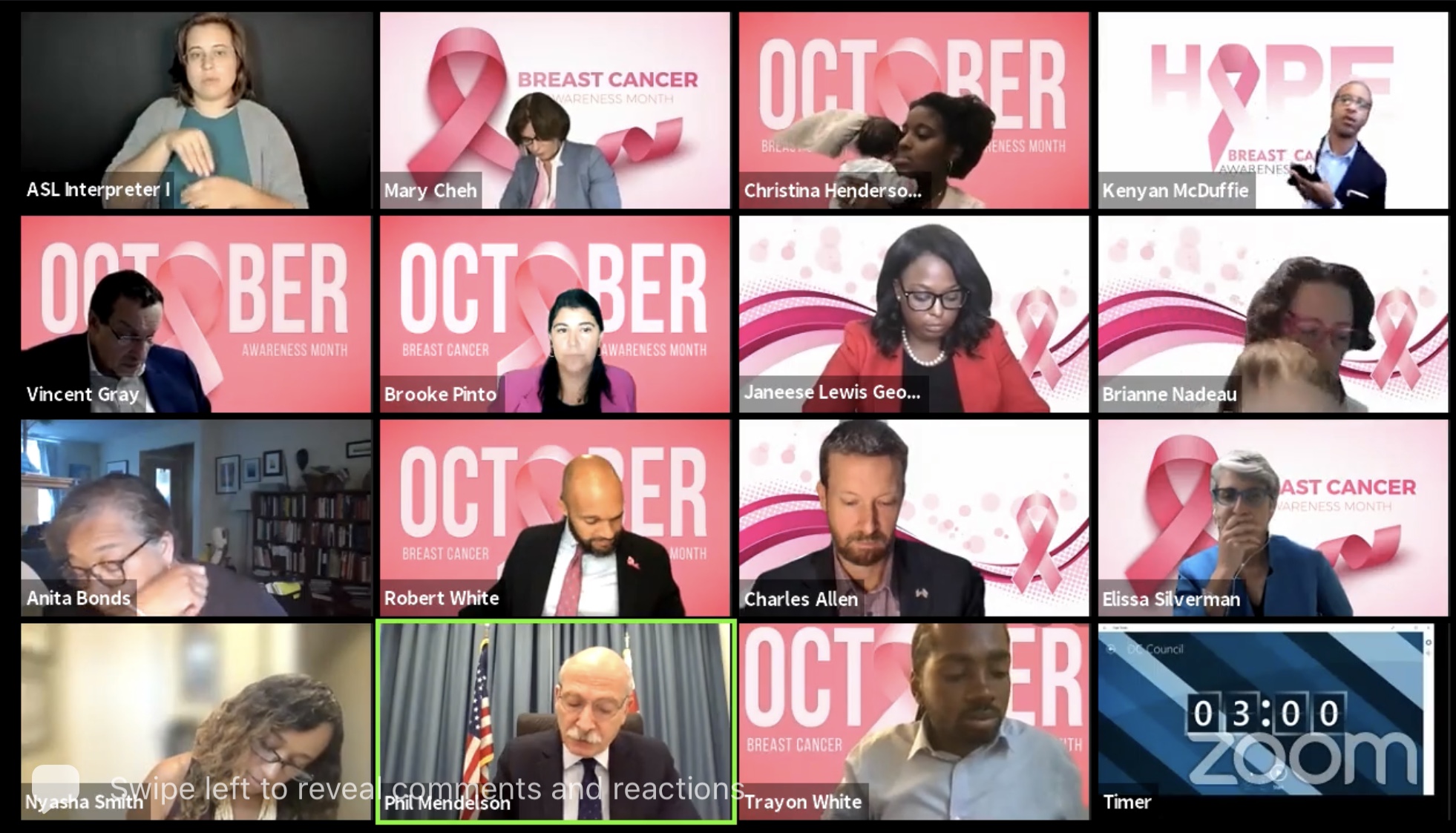Council Broadens Virtual Learning, and Imposes Vaccination Requirement for Council Staff

At its first Legislative Meeting since August, the Council passed a broad range of legislation that builds upon the extensive fact-finding, agency oversight, and public input gathering that occurred since the prior meeting.
COVID and Schools
In September hearings on COVID, school re-openings, and the state of our educational facilities, councilmembers heard loud and clear that while parents and students value in-person instruction, they felt that eligibility for virtual learning since the school year began was excessively strict. Most glaring was the fact that only those students declared by a doctor to be “required” to learn from home were eligible for virtual learning. Medical conditions sufficient to trigger virtual learning for a student were completely ignored by the system if a healthy student lives full-time with (and comes home from school each day to) a sibling, parent, or caregiver with that exact same condition. Children kept home by their parents out of such a fear that a healthy child could infect an immune compromised relative faced unexcused absences and visits from the Child and Family Services Agency.
Parents also expressed frustration that when a COVID infection occurred in their school, only a school-wide generic letter would be sent, and close contacts of the infected individual would be notified of their need to quarantine. Parents of children in such classes who were not close contacts would receive no class-specific notification, and would rely exclusively on the rumor mill for information. Parents also expressed support for expanded asymptomatic COVID testing.
The bill passed unanimously at the most recent Legislative Meeting directly tackles each of these concerns. First, it replaces the prior standard for health-based virtual learning from a student being “required” by a doctor to stay home, and now instead states that the stay-home order can be simply “recommended.” Second, it makes allowances for students living with immune-compromised family members. Third, it provides some flexibility on some COVID-related unexcused absences. And finally, it specifically requires classroom-specific notifications of all students (and not just close contacts) in a class when a COVID infection is detected. And under the new Council measure, COVID testing would expand from the current 10 percent of students to 20 percent.
The Council’s solution to these different issues was greatly complicated by the idiosyncrasies of how the Council is required to legislate. In general, the Council can legislate in one of two ways. Via the first option, the Council can pass legislation permanently but via a slower process, on issues that do or do not involve increased spending, as long as there is a majority of at least seven votes. Via the second option, known as “emergency legislation,” the Council can legislate briefly (for just 90 days) but immediately—as long as there is a supermajority (9 votes) in support, and the bill imposes zero additional cost on the government.
Due to the urgency of the pandemic, the Council opted for the latter option for its COVID school reforms, but despite prior Administration statements that the school system had existing excess virtual learning capacity, there was a worry that the Council’s bill would portrayed as generating additional cost. As an additional bulwark against this potentially dubious assessment, the Council included further restrictions on its expansion of virtual learning—making it apply only to students who could not be vaccinated (for age or medical reasons), and imposing a numeric ceiling on the number of new virtual learners.
Other Topics
In other action at its most recent Legislative Meeting, the Council was again put in the position of making the best of a negative situation created elsewhere in the government. Due to a mismanaged contracting process, the Council was faced with only bad choices—to renew a contract with a Medicaid provider who had been deemed in violation by the Contract Appeals Board, or to allow the expired contract to remain expired, leaving some Medicaid recipients in limbo in the midst of a pandemic. In the end, the Council chose to extend contracts with the three Medicaid providers for nine months, time enough for the administration to run a new bidding process for all contractors.
Also at the most recent meeting, the Council imposed a vaccination mandate on its own staff (the Council has independent personnel authority, so it is not covered by the mandate on other DC government staff). Under the mandate, all existing staff must be fully vaccinated by October 31, and all new staff must provide proof that they are already fully vaccinated prior to starting their job. Medical and religious exemptions will be determined on a case-by-case basis, under tight restrictions. Violations of the policy by Council staff will result in the employee being placed on unpaid leave, with escalating further discipline, up to and including termination. Although councilmembers each have personnel authority over their own personal staff, the enforcement authority for the COVID vaccination requirement has been centralized under the Council chair.
In other legislation, the Council extended the ongoing foreclosure moratorium until February 4 to allow time for the federal and District governments to roll out a $50 million Homeowner Assistance Fund to aid qualified applicants who are in arrears on their mortgages. Additionally, the Council re-upped its emergency omnibus eviction reform act passed back in October, eased access to Emergency Rental Assistance Program funds, and required that for pending pre-COVID evictions, a landlord must check to see if the tenant has a pending ERAP or STAY DC application, and if so, postpone the eviction for three weeks to allow that application to to play out.
The Council also passed a “sense of the Council” measure supporting a public health insurance option, or “Medicare for All,” and another measure expanding the qualifications for new members of the Public Service Commission so that one has experience with consumer protection and another with renewable energy technology.
The Council’s next Legislative Meeting is scheduled for November 2.